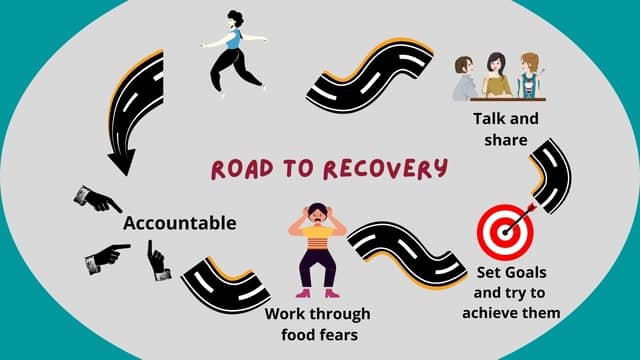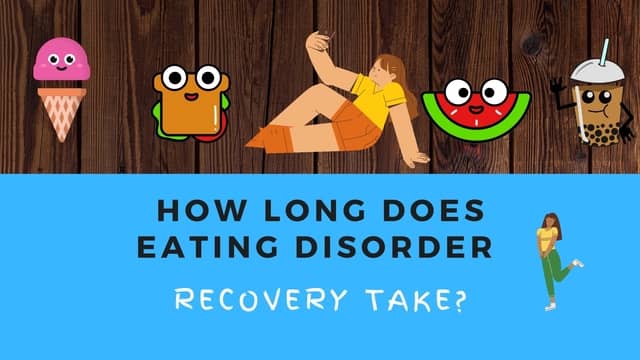Eating disorders often take a toll on the body and the mind, leading to persistent thoughts of food, weight, and calories. The journey to eating disorder recovery may involve overcoming challenges such as anxiety, depression, and self-esteem issues. So how long does eating disorder recovery take? Many things can come up during recovery that needs to be addressed. You might still think about the food you were restricting or the weight you were trying to lose. These thoughts may lead to feelings of guilt, shame, sadness, failure, and anger. Learn more about how long eating disorders recovery takes here.
Table of Contents
What is an eating disorder?
Eating disorders are mental illnesses that cause your brain to make obsessive thoughts about food and your body. Some types of eating disorders, such as anorexia nervosa, also cause your body to lose weight. These thoughts are so strong that you stop eating, or even go days or weeks without eating. If you have an eating disorder it may cause you to go an entire day without eating, you may feel tired and weak. You may not have an appetite. You may even have cramps, a headache, or dizziness. This can lead to hospitalization and possibly death.
Understanding Eating Disorders
The idea that someone who is eating is in recovery from an eating disorder is not widely accepted, and the general suggestion is that the person in question needs to “do it on their own”. The medical community doesn’t agree. It is recommended that patients not skip meals in the first 6 months after treatment, because this can cause low blood sugar. Another example is the value of “moderation in all things,” with the understanding that individuals vary in their responses to foods and nutrients.
How to know if you have an eating disorder?
Eating disorders are medical conditions. An eating disorder has to be accompanied by certain symptoms.
Signs and symptoms of an eating disorder
In the case of Anorexia nervosa, people may restrict their food intake to as little as 100 calories. They may feel this way and believe it is normal, but they may want to lose weight for several different reasons. Anorexia nervosa symptoms often develop slowly and over time.
Signs and symptoms include:
- Cutting or depriving calories of the diet
- Starvation
- Extreme weight loss
- Avoiding meals
- Binging or overeating
- Anxiety
- Stress
- Panic attacks
- Discouragement from eating
- Prolonged malaise
- Devouring of food
Factors that Affect Recovery
People recover at different rates. Some people may need longer to recover than others. Recovery also depends on the severity of your disorder. Many people will have varying levels of eating disorder symptoms for different amounts of time before they seek treatment.
The Stages of Recovery
Most eating disorder sufferers are diagnosed with bulimia nervosa, anorexia nervosa, binge eating disorder, or both at some point. People do not recover from an eating disorder overnight, or even in a few months. Most recover over time, but there are some with lifelong complications and one-time sufferers who do not recover at all. For others, the process varies greatly depending on the individual’s specific factors. What a person eats and the amount they weigh over time can affect their recovery period. When in recovery from eating disorders, one must learn to eat foods that work for them and learn to avoid foods that don’t.

How long does recovery from eating disorders take?
There is no time limit on recovering from an eating disorder, nor any timeline for when this should happen. Countless studies explain that treatment protocols and coping skills may take anywhere from 1 to 10 years, but at the same time, no two cases of eating disorder recovery are the same and they usually take much longer than that. Some recovery strategies that are effective for some people may be ineffective for others. After all, these disorders run in families, so there is a strong genetic component to them that also makes recovery harder. They are also relatively uncommon, so some fewer people have firsthand knowledge and experience to work with them.
Some might be motivated by the fear of dying from starvation. Some people find that they require the help of a trained professional. Eating disorders take a toll on physical and mental health, and phases of recovery take a while.
How to recover from an eating disorder?
Eating disorders are mental illness that affects many individuals.
- Do meditation or yoga daily in the morning.
- Take time to deal with all that has occurred.
- Plan the various ways that assist you with arriving at your healthy self.
- Recovery is a deep-rooted process. Your sentiments may change over the long run. Take the help of a therapist. Don’t take this illness lightly and always consult your doctor. Eating disorders cause deaths if not taken seriously. This is one reason it is important to find ways to cope with your thoughts and feelings. Most eating disorders cannot be completely cured. But, you can learn new ways to cope with the feelings that keep you from feeling your best.
- Having a support group or talking to someone about your feelings is important. There are support groups and 24/7 mental health hotlines that will be a great help.It can be difficult to recover from an eating disorder alone. There are many support groups available for eating disorder survivors. Talking with other people about your experience and offering mutual support can be beneficial to recovery.
- Cut down on the amount of stress you’re under. Eating disorders like recovering from anorexia come with a lot of stress. Cutting back on the amount of stress you’re under can be helpful. The process of recovering from an eating disorder can help you develop new coping skills that can help you manage stress in the future.
- Set Goals – Set a time frame for recovery and set goals for your health, fitness, and mental well-being. These goals should be measurable, realistic, and achievable. If you don’t set goals, you may be reluctant to try to reach your goal or not have the motivation to do so.
- Find Support – It is important to talk to people you trust about your eating disorder. These people can be friends, family, or professional therapists. Let them help you understand and deal with any worries and anxiety that you’re experiencing while you are recovering, it’s important to allow yourself to feel what you feel. There’s no shame in this. This is normal! You may feel anxious or depressed when your progress is slow when you have a bad day, or even when you’re gaining weight.
- Focus on the future – Set goals for yourself. Keep in mind that if you set an unrealistic goal you will most likely fail. Plan a monthly exercise plan. Write out a plan for exercises that will have you feeling energized, supported, and proud. Remember, recovery is a process, and you have many milestones to reach before you reach the finish line.
- Seek medical help – It is of utmost importance to visit a medical professional. Your medical professional can help diagnose and treat eating disorders and symptoms. He or she can help monitor you throughout your treatment.
Conclusion
All women who are recovering from eating disorders need help from others. Recovered anorexic women need to help others through the many difficulties and setbacks of the process of healing from an eating disorder. Being in recovery from an eating disorder can be a difficult process, but it can also bring you to a wonderful place. Keep your focus on becoming healthy, and don’t let yourself get sidetracked.
Disclaimer
The content of this article has been developed by third-party medical content writers and/or experts. The information mentioned in the article is only for educational purposes and therefore it is requested to consult a doctor/ physician before diagnosing and deciding the treatment plan.
Healthoplane, its Licensors nor any third-party content providers do not guarantee the accuracy, completeness, or usefulness of any content. Furthermore, neither Healthoplane nor its Licensors endorse or are responsible for the accuracy and reliability of any opinion, advice, or statement made on this article or any of the Sites or Services. We take no responsibility for your exposure to third-party content on the Sites or the Services. Healthoplane and its Licensors do not assume, and expressly disclaim, any obligation to obtain and include any information other than that provided to it by its third-party sources. It should be understood that we do not advocate the use of any product or procedure described in the Sites or through the Services, nor are we responsible for misuse of a product or procedure due to typographical error.
Consent
By using our website, you hereby consent to our disclaimer and agree to its terms.
Dr Amit Sharma is a Doctor and writer with a particular interest in mental health. He helps individuals by combining practical advice with emotional support.
